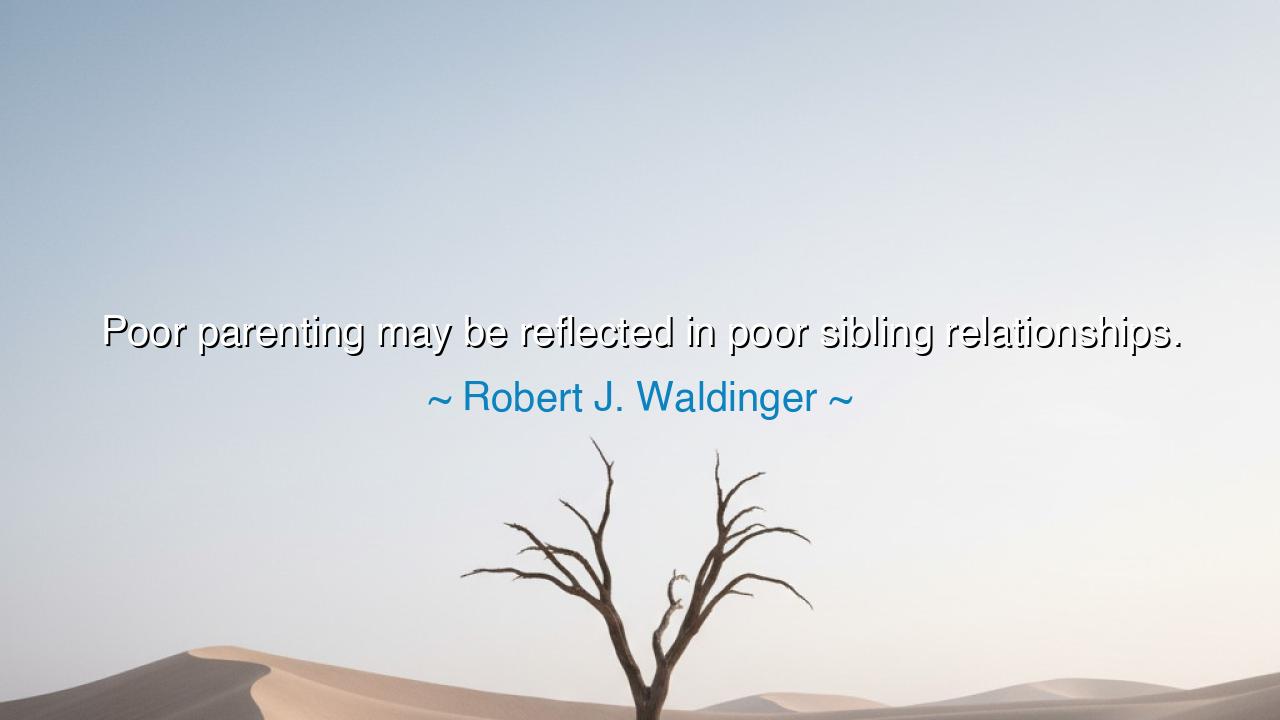
Poor parenting may be reflected in poor sibling relationships.






Hearken, O children of generations yet to rise, and heed the wisdom of Robert J. Waldinger, whose voice illuminates the hidden currents of family life: “Poor parenting may be reflected in poor sibling relationships.” In these words lies a profound recognition: that the bonds forged in the hearth of childhood mirror the care, attention, and wisdom—or their absence—bestowed by those who guide the young. The manner in which children are nurtured shapes not only their character, but the harmony, empathy, and resilience of the ties between brothers and sisters.
The origin of this reflection rests in Waldinger’s study of family dynamics, where decades of observation reveal that sibling relationships often bear the imprint of parental conduct. When guidance is inconsistent, neglectful, or harsh, children may grow to mistrust, compete, or resent one another. Conversely, when parenting is attentive, fair, and compassionate, siblings learn cooperation, empathy, and mutual respect. Waldinger’s insight is timeless: the health of relationships among children is inseparable from the quality of nurturing, moral instruction, and emotional presence of the parent.
The meaning of his words is both practical and moral. Parenting is not a solitary endeavor affecting only the parent-child dyad; it is the foundation upon which family harmony, social skills, and emotional resilience are built. Poor parenting—manifested as favoritism, neglect, or harshness—sows discord and rivalry, teaching children mistrust, resentment, or self-centeredness. Waldinger reminds us that the seeds of relational virtue or strife are sown in the home, and that attentive care strengthens bonds that endure a lifetime.
Consider the life of John Adams and Abigail Adams, whose consistent guidance, moral instruction, and equitable treatment fostered bonds of respect and cooperation among their children. They understood that nurturing each child with attention and fairness cultivated mutual regard, loyalty, and understanding, shaping sibling relationships that reflected the care and integrity of the household. In this, Waldinger’s words find embodiment: parenting is the crucible in which the quality of sibling connections is forged.
Yet Waldinger’s reflection carries a subtle admonition: the consequences of poor parenting extend beyond the immediate well-being of the child. They ripple outward, influencing the patterns of friendship, cooperation, and trust that will mark the child’s life. Sibling rivalry, resentment, or estrangement may echo long after childhood, revealing that the labor of nurture shapes not only character, but the relational architecture of life. True parenting must therefore be intentional, fair, and morally guided.
The lesson for future generations is radiant: cultivate relationships among children through equitable, consistent, and loving guidance. Attend to each child’s needs, model respect and empathy, and intervene thoughtfully in conflicts. Recognize that sibling harmony is not incidental, but a reflection of parental integrity, fairness, and attentiveness, and that nurturing the bonds among children is as vital as teaching them the virtues of life itself.
In practical life, one may follow Waldinger’s counsel by fostering fairness, presence, and moral example in daily parenting. Avoid favoritism, listen attentively to each child, and cultivate an environment of shared respect. Mediate conflicts with patience, guide empathy through example, and celebrate cooperation alongside achievement. In this manner, children learn not only virtue, but the value of harmonious relationships, carrying lessons of loyalty, trust, and empathy into their adult lives.
Thus, O children of future ages, carry this teaching as both lantern and compass: poor parenting may be reflected in poor sibling relationships, and conversely, wise and loving guidance cultivates bonds that endure a lifetime. Attend to the cultivation of fairness, care, and compassion, for the harmony of the young reflects the integrity of the household. In this sacred labor lies the shaping of character, the nurturing of relational virtue, and the enduring legacy of love, wisdom, and human connection across generations.






AAdministratorAdministrator
Welcome, honored guests. Please leave a comment, we will respond soon